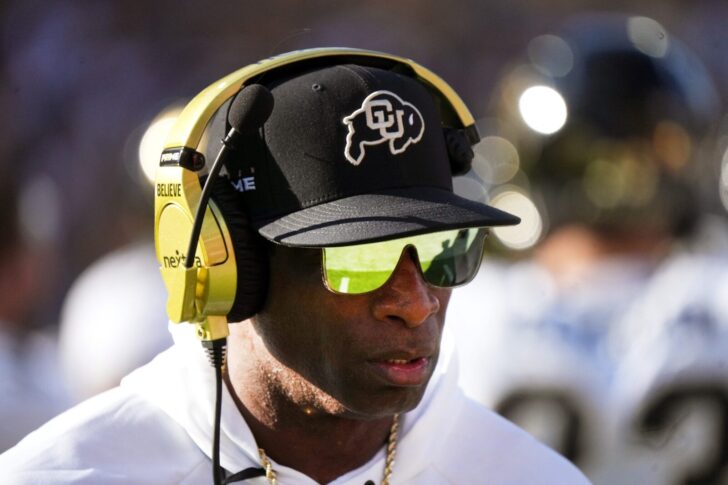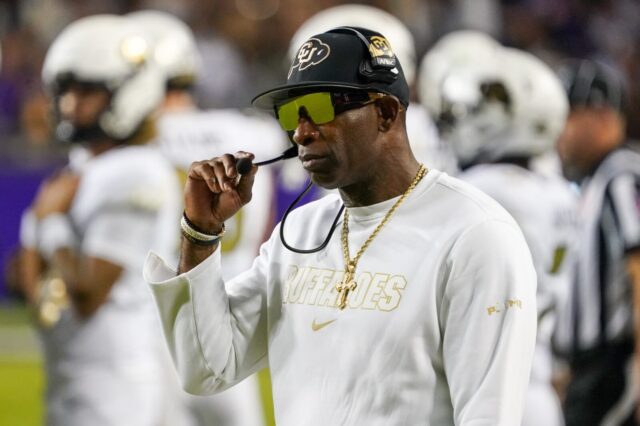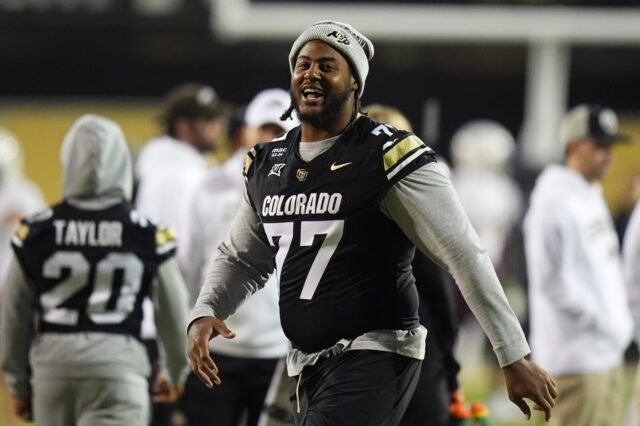Strike 3: Deion Sanders is relatively new to college football coaching, having just completed his fourth season. He doesn’t have a ton in common with his CFB brethren at the moment, choosing to be more of a rebel and an outlier than fitting into the mold. Still, there’s one thing he’s figured out quickly, and is in lockstep with most of those in his profession.
Shortly after one of his high school recruits “de-committed” from the 2024 CU recruiting class earlier this month, Sanders bemoaned the lack of loyalty, and the fact that any sort of pledge or verbal “commitment” today is pretty much meaningless. “A kid ain’t even faithful to his girlfriend,” Deion complained. “You think he’s gonna be faithful to a school?”
He went on to urge the NCAA to make it against the rules for a verbally “committed” recruit to visit other schools. Good luck with that.
Yes, there’s a certain amount of hypocrisy in any statement about loyalty coming from college football’s anointed “King” of the transfer portal, but he’s not wrong.
Because previous NCAA rules have been shredded by politicians and lawyers, what’s actually in the best interests of 18-year-old, wet-behind-the-ears kids isn’t the way things are being done anymore.
The phrase “I’m committed to…” has become all but meaningless.
Whereas in previous years, a high school kid might commit and then de-commit – or a current CFB player would choose to transfer – based on feelings about playing time, more and more and more it’s become all about money, plain and simple. “Where am I going to go and get paid!”
The evaporation of the rules involving players transferring schools – and a few have even done so before they officially enrolled for their first year – has created a situation where these “student” athletes (at least that façade is still in place at most institutions) are free to come and go as they please, on a whim, chasing a better pay day while failing to learn valuable lessons that sports are supposed to teach – perseverance, the value of hard work and how to earn your place at the top.
Former Kentucky basketball coach Tubby Smith saw all of this coming several years ago.
“Teaching them to quit. That’s what we’re doing,” Smith stated back when the transfer portal was new. “Things not going well? Let’s quit.
“I remember calling my dad when I was a freshman. I said, Dad, people not treating me…and this and that. I’m unhappy here. He said, ‘Son, somebody do something to you?’ I said no. ‘You’re still getting your scholarship aren’t you? They’re still feeding you, they’re still housing you? You’re still getting your education?’ I said yes sir. He said, ‘You can’t come home. Your bed’s been taken. But you can join the Army.’
“Best thing that ever happened to me.”
Politicians – the ones who fought for Name, Image and Likeness privileges for players, and the ones who have now made it possible – again – for players to transfer an unlimited number of times – are creating a generation of me-first, quit when the going gets tough softies.
The real world is going to punch them right in the face.
As the NCAA tries to get some sort of guardrails in place before the entire student-athlete foundation has turned to dust, they should consider one simple change (with the approval of lawyers, of course.) Turn all scholarships into a binding, two-way enforceable contracts. If the players don’t like it, there’s always the Army, or the USFL.
When you sign your letter of intent and your grant-in-aid paperwork with a university, the student-athlete and the school are contractually bound together for the next five years or until the student-athlete graduates – with an exemption if the coach that recruited that player leaves or gets fired. This would have to come with increased compensation via scholarship stipends, which could and should be increased dramatically with the players getting a share of marketing and media rights revenue. It could be done.
Want to end all this de-commitment and transfer nonsense like Deion says he does? Force the word “committed” to mean something again.





